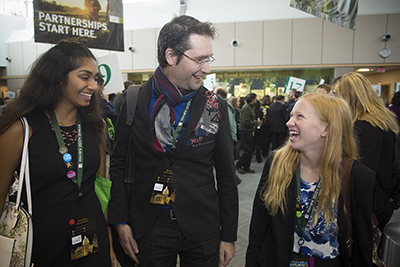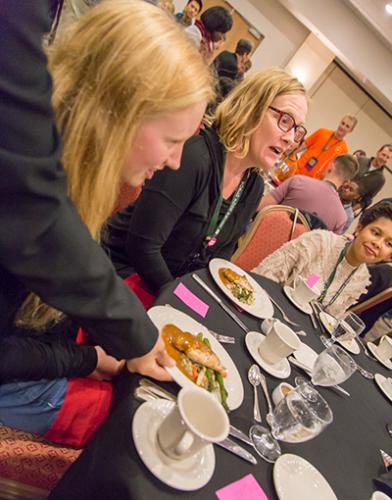Pearl Daskam represents Michigan at 2016 World Food Prize Global Youth Institute
Six outstanding youth leaders were selected to represent Michigan at the Global Youth Institute, where they shared their global hunger fighting research and ideas. This series highlights their stories.

From addressing hunger issues by raising chickens for her local food bank, to addressing sustainable agriculture in faraway America Samoa, one youth from Ubly, Michigan, is engaged in solving critical issues related to local and global food security. Pearl Daskam, a sophomore from Cass City Homeschool, traveled to Des Moines, Iowa, Oct. 12-15, 2016, to participate in the World Food Prize Global Youth Institute, where she shared her research and recommendations for addressing global food security with peers and experts from the U.S. and around the world.
The World Food Prize was founded by Nobel Peace Prize laureate Norman Borlaug to recognize and inspire great achievements in improving the quality, quantity and availability of food in the world. This year’s World Food Prize Borlaug Dialogue International Symposium focused on the theme “Let Food Be Thy Medicine” and gave special emphasis on issues such as the crucial role of nutrition in global food security, leadership, biofortification, conflict and infrastructure. Global Youth Institute students and teachers had the opportunity to take part in symposium sessions with the top minds and foremost leaders in global agriculture, food and development.
Daskam was selected as one of Michigan’s youth delegates to the 2016 World Food Prize after writing a research paper on the topic of sustainable agriculture in America Samoa. She presented her research at the World Food Prize Michigan Youth Institute, which was held on the campus of Michigan State University in East Lansing, Michigan, on May 12, 2016. The World Food Prize Michigan Youth Institute is a pre-college program that engages Michigan youth as active global citizens in understanding and solving global food security challenges and provides an opportunity to explore academic and career pathways, which can contribute to ending global hunger and malnutrition. The World Food Prize Michigan Youth Institute is coordinated by Michigan 4-H in partnership with the MSU College of Agriculture and Natural Resources, MSU Extension, Michigan FFA and the World Food Prize Foundation.
 Daskam decided to participate in the World Food Prize Michigan Youth Institute because she wanted to learn more about global hunger. “I had been researching issues on American Samoa and it was the perfect time to be able to narrow down my research and write a paper,” she said. “I loved the idea of getting to go to Michigan State University and talk to professionals about things I am interested in.”
Daskam decided to participate in the World Food Prize Michigan Youth Institute because she wanted to learn more about global hunger. “I had been researching issues on American Samoa and it was the perfect time to be able to narrow down my research and write a paper,” she said. “I loved the idea of getting to go to Michigan State University and talk to professionals about things I am interested in.”
In her research paper, Daskam made recommendations regarding the viability and sustainability of pig farms, which accounts for one of the island territory’s largest agricultural activities. She recommended the implementation of improved waste management practices in American Samoa piggeries, including developing and using centralized composting facilities to address waste and carcass management and environmental health issues.
“The aspects of global food security that I am most interested in are the aspects that involve one-on-one contact with farmers,” Daskam said. “I would like to be part of helping to get the information to the farmers and be part of the hands-on aspect of relieving hunger.”
At the 2016 World Food Prize Global Youth Institute, Daskam joined over 200 other outstanding high school students and mentors from 31 U.S. states and foreign countries for an exciting three-day program to interact with Nobel and World Food Prize Laureates and the more than 1,500 global leaders from 60 countries attending the World Food Prize’s 2016 Borlaug Dialogue International Symposium. Daskam and the other delegates learned about innovative, impactful and cutting edge topics related to global food security and nutrition by attending presentations and panel discussions led by global leaders in international development, policy, science and industry.
At the World Food Prize Global Youth Institute, youth delegates also toured world-renowned research facilities, packed meals for Haiti disaster relief efforts, participated in an Oxfam America Hunger Banquet and networked with other young people who share an interest in addressing topics related to global food security. Delegates were also able to watch the 2016 World Food Prize Laureate Award Ceremony, where the 2016 World Food Prize laureates Maria Andrade, Howarth Bouis, Jan Low and Robert Mwanga were honored for their work in “the development and implementation of biofortification, breeding critical vitamins and micronutrients into staple crops, thereby dramatically reducing malnutrition, stunting and ‘hidden hunger’ for millions.” Through the combined efforts of the four laureates, over 10 million people are now positively impacted by biofortified crops, with a potential of several hundred million more having their nutrition and health enhanced in the coming decades.
 Daskam described her experience as “an action packed three-day adventure where you think you understand global hunger and when you’re done, you realize there is so much more.”
Daskam described her experience as “an action packed three-day adventure where you think you understand global hunger and when you’re done, you realize there is so much more.”
“You get to talk face-to-face with very interesting people from all over the world,” she said. One of the most impactful experiences for Daskam was hearing from inspiring leaders from around the world, such as Bettie Kawonga, a young leader from Malawi who is helping increase youth employment and entrepreneurship in Malawi’s dairy industry.
Daskam believes it’s important for teens to think beyond their local community, but also sees a strong link between local and global perspectives. “I think it’s important for people my age to think globally,” she said. “I come from a small, rural community and I think it is important to think beyond our little town. I want to be part of something much bigger, but I also think that I can be a better community member because I have a global view. We have hunger issues right here in my county and attending the World Food Prize Global Youth Institute helped me realize what I can do here locally to help.”
What advice does Daskam have for other Michigan youth who want to make a positive difference in the world? “Start at home,” she says. “Take every opportunity you can to be a positive member of your world.”
Daskam’s impact on food security goes beyond words of encouragement for her peers; she is leading by example. Daskam, along with a friend, are addressing the nutritional needs of local families by raising and distributing chickens through their local food bank. Their project has been awarded a two-year, $2,500 grant from FFA to support their work in providing much needed sources of protein to local families.
The next World Food Prize Michigan Youth Institute will be May 11, 2017, at MSU. Visit the Michigan 4-H website to learn more about the World Food Prize Michigan Youth Institute.
To learn about the positive impact of Michigan 4-H youth leadership, civic engagement, citizenship and global/cultural programs, read our 2015 Impact Report: “Developing Civically Engaged Leaders. Additional impact reports, highlighting even more ways Michigan 4-H positively impacted individuals and communities in 2015 can be downloaded from the Michigan 4-H website.



 Print
Print Email
Email



